Orthodox economics is the ideology of the rich and powerful, writes Dian Maria Blandina. Poor countries such as Sudan, that are trying to develop, cannot afford a regime of free trade.
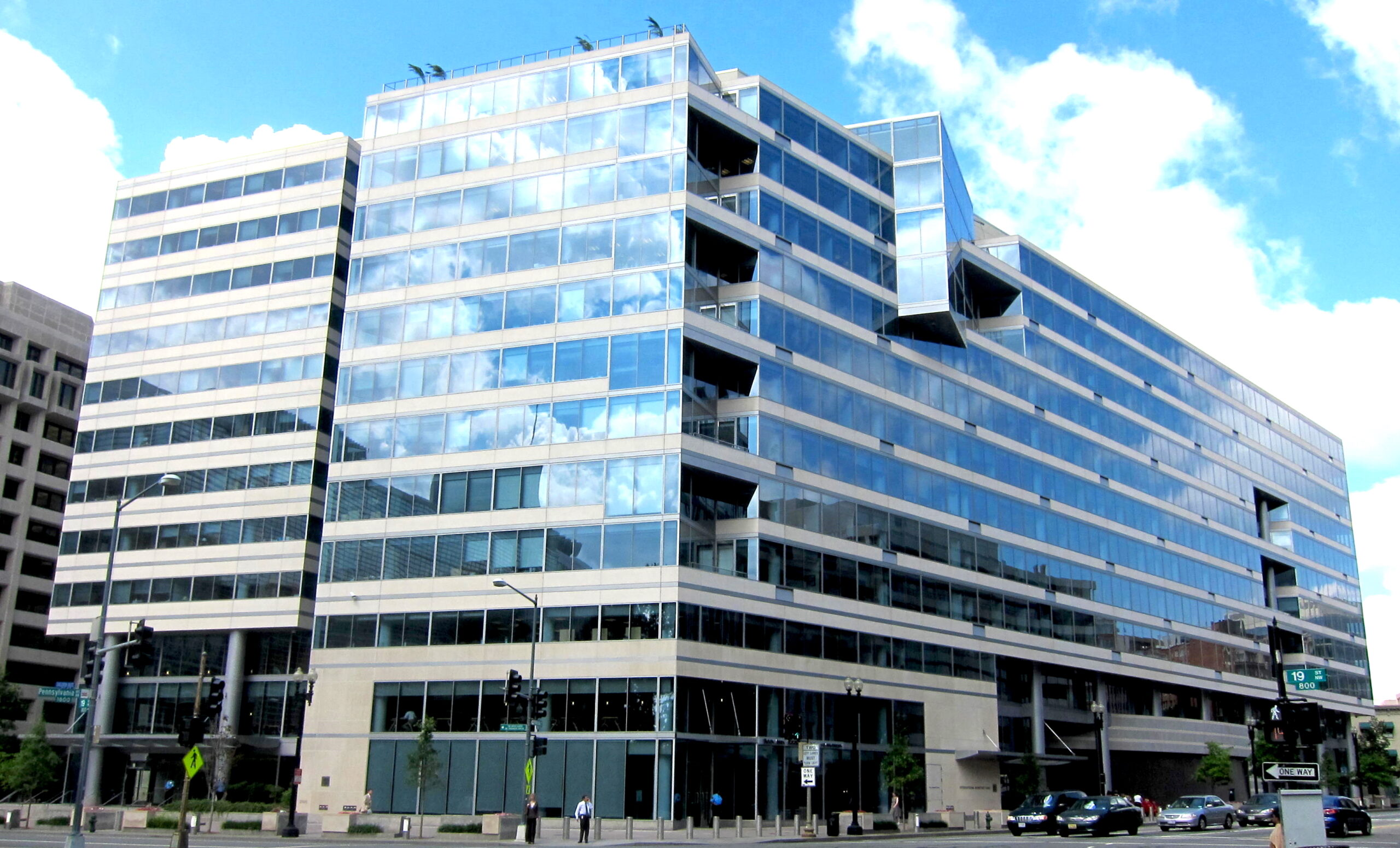
The International Monetary Fund headquarters in Washington, D.C. (AgnosticPreachersKid, CC BY-SA 3.0, Wikimedia Commons)
By Dian Maria Blandina
Peoples Dispatch
 Sudan is experiencing its fourth week of conflict between two military factions, which has caused the death of over 700 people.
Sudan is experiencing its fourth week of conflict between two military factions, which has caused the death of over 700 people.
Sudanese civilians have fled the capital and the country altogether while the fighting continues with no end in sight. Commentators have so far focused on the military factions and ethnic conflicts.
[Related: AS’AD AbuKHALIL: Who Is Fighting Whom in Sudan?]
U.N. urges halt to Sudan conflict as fighting rumbles on despite talks https://t.co/3iuFasSUVV pic.twitter.com/pRVxl3KgLj
— Reuters (@Reuters) May 12, 2023
A reductive explanation has been given for the food crisis in Sudan, such as economic crisis, climate change and the Ukraine war. The significance of macroeconomic policies and the institutions that promote them at the root of these crises tend to be overlooked.
Toppling Over the Breadbasket
The IMF imposed liberalization in Sudan, particularly in the agricultural sector, to promote exports. Liberalization means removing any barriers to trade and eliminating obstacles to foreign investment, while at the same time reducing the size and power of the government to regulate the economy.
Orthodox economics is the ideology of the rich and powerful. Poor countries trying to develop like Sudan cannot afford a regime of free trade. Sudan should have been left to develop its agricultural sector to serve its own people first.
Seeing Sudan in the news now, it’s hard to imagine that it was once destined to be the “breadbasket of Africa.” Sudan is not only rich in oil and minerals, but also arable land.
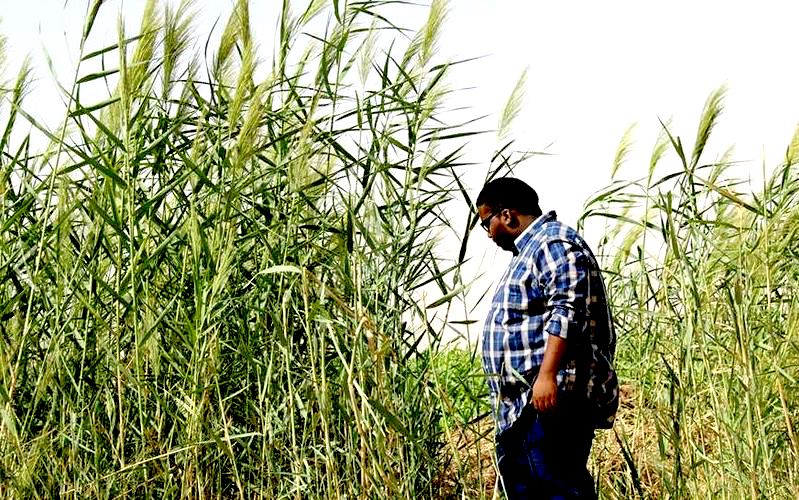
Wheat plantation in Karima in northern Sudan, 2014. (Noory Taha, CC BY-SA 4.0, Wikimedia Commons)
As explained in Oxfam’s 2002 report, rapid agricultural liberalization was a key cause of rising poverty and food insecurity in Africa. The consequences are still experienced to this day.
Liberalization policies are also eerily similar to extractive practices in the colonial era; in this case, turning Sudan into the world’s farm while the people starve. Back then, there were also local and not-so-local businesses and politicians who facilitated the colonial powers in extracting Africa’s riches and exploiting its labor force.
Sudan has a diverse population of over 600 ethnic groups speaking 400 languages, with Islam being the predominant religion. The country has experienced two civil wars, three coup d’états and a 30-year military dictatorship under Omar Al-Bashir that ended in 2019 following an uprising.
A transitional government was established under Prime Minister Abdalla Hamdok, but it was fragile, and in October 2021, the military dissolved the government and placed the prime minister under house arrest, leading to protests and violent crackdowns that have resulted in more than 100 civilian deaths and many more injuries.
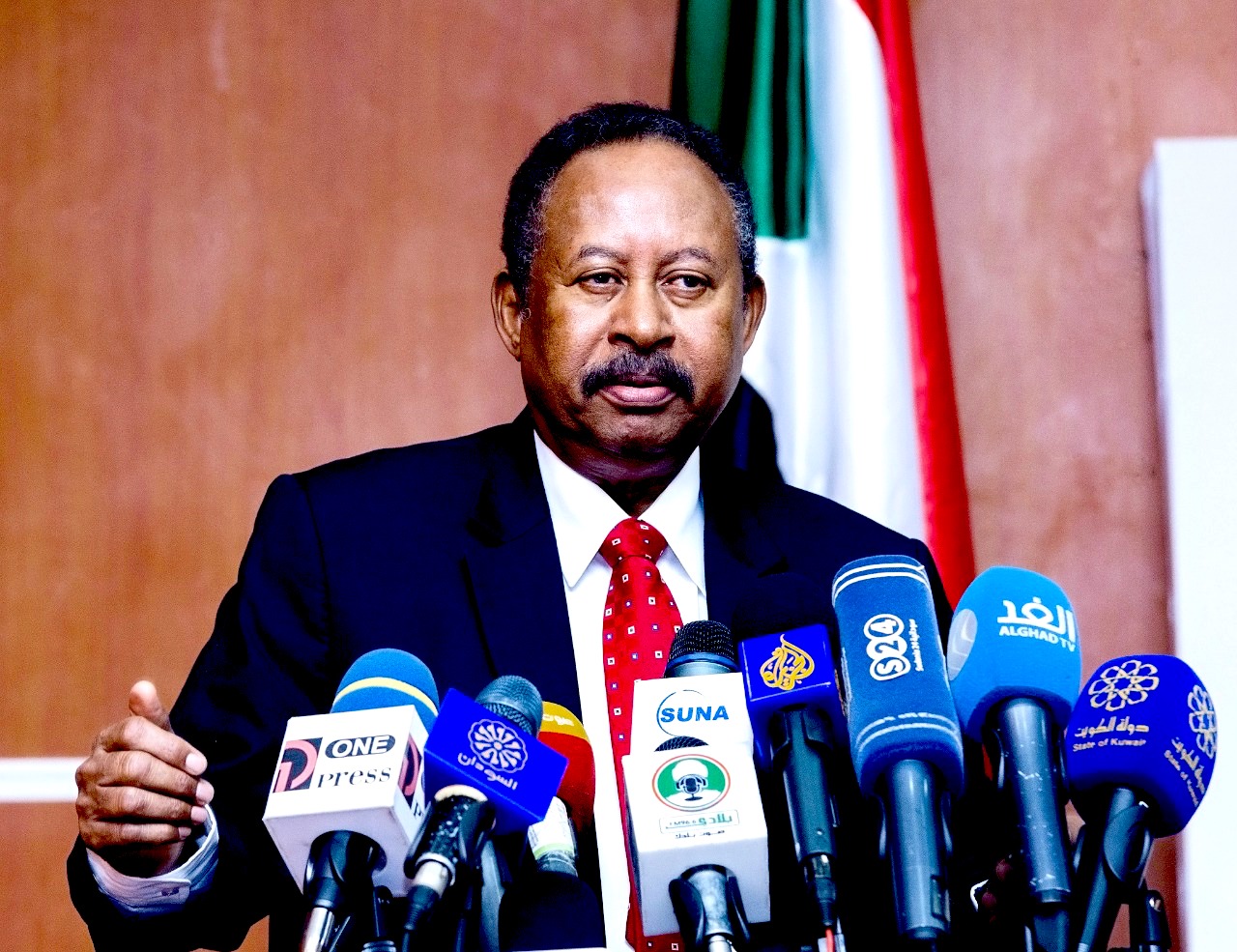
Sudanese Prime Minister Abdalla Hamdok in Khartoum in 2019. (Ola A .Alsheikh, CC BY-SA 4.0, Wikimedia Commons)
The IMF has long been involved with Sudan. To date, Sudan has undergone at least 11 IMF programs in between civil wars and conflicts. Between 1979 and 1985 alone, under Nimeiri’s regime, there were five IMF loan programs in Sudan. Outside of the programs, the IMF maintained counsel to the government, giving policy advice that would “help” Sudan’s creditworthiness and access to the international market.
From the start of their relationship, Sudan has been in the weaker position. Highly ambitious development projects in the 1970s combined with years of ill-advised investments left the country in a severe deficit and with no bargaining power against international institutions and foreign powers.
The IMF dealt with Sudan in a very autocratic manner, handing down conditionalities and expecting the Sudanese government to implement them with no care of how it’s done.
An unusual feature of the IMF-Sudan relationship was that Sudan was almost always expected to conceive and implement austerity on its own, prior to receiving loans.
The IMF also dealt with Sudan harshly, cutting off credits and aid at the slightest sign of non-compliance or policy disagreement, and imposing increasingly severe terms. The dynamic was so perplexing that scholars used Sudan as a case study to understand power struggle in IMF programs.
Protests, Riots, Coup, Repeat
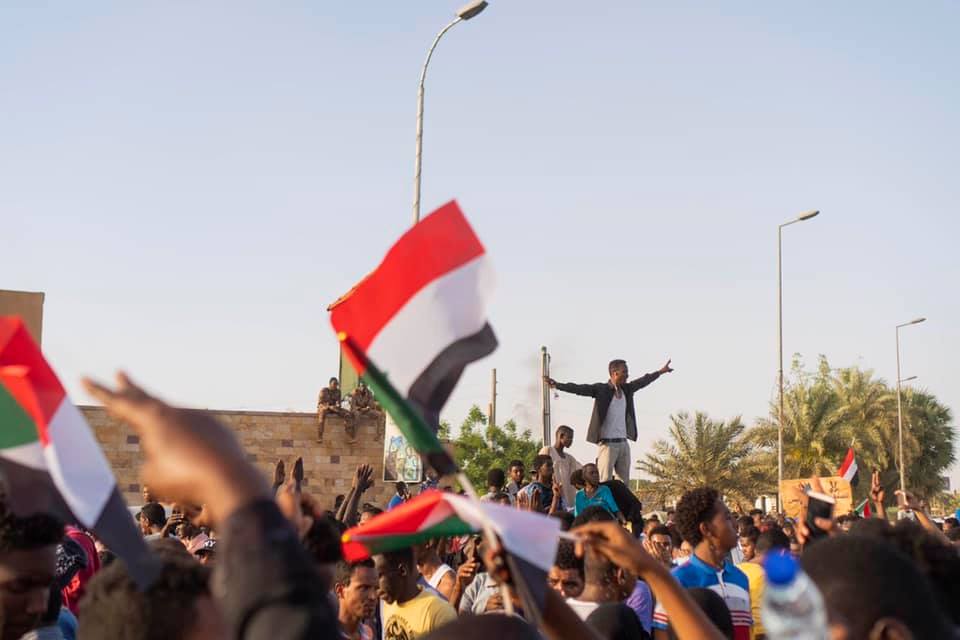
Sudanese protestors near the army HQ in Khartoum, April 2019. (M.Saleh, CC BY-SA 4.0 via Wikimedia Commons)
IMF “riots” took place many times in Sudan throughout the 1970s and ’80s because of cuts in subsidies and currency devaluation which made basic commodities expensive.
For a large and diverse country divided by factions like Sudan, such policies quickly turned to social unrest. One of these protests in 1985 led to a coup d’etat when the military intervened.
Scholars have studied social unrest during IMF programs over the past 40 years and found a correlation with coup d’états. IMF programs create winners and losers among both common people and regime elites, leading the “losing” elites to put up a new leader who is more likely to reject conditionalities unfavorable to their interests.
Sudan’s diverse nature and complex historical context have contributed to internal conflicts in the country. The IMF’s push for foreign investments has brought in foreign actors with their own interests, further complicating matters and making Sudan a hotbed for geopolitical struggles and power plays.
In 2012, anti-austerity protests brought thousands of people to the streets of the capital, Khartoum. Citizens were angry over the fuel-subsidy cuts imposed by the IMF combined with rising inflation and called for Bashir to leave the presidency.
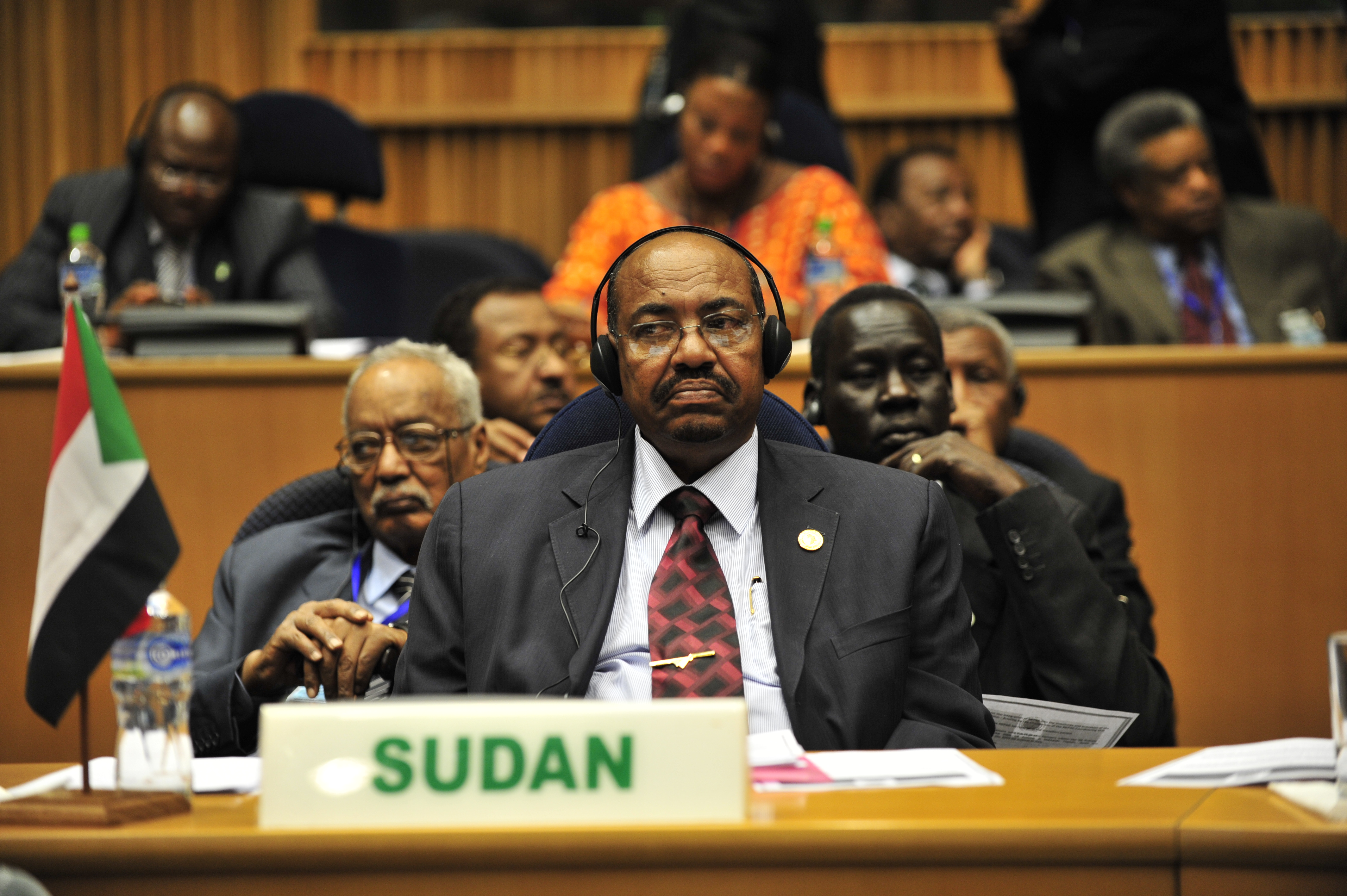
Sudan’s Omar al-Bashir during development conference Addis Ababa, Ethiopia, 2009. (U.S. Navy/Jesse B. Awalt, Wikimedia Commons)
Clashes ensued. It also led to another coup d’etat attempt which ultimately failed.
Still, the IMF pushed for subsidy cuts demanding the government “communicate the shortcomings of price subsidies and the urgency of the need for reform.”
It noted that cuts should be implemented gradually, while also acknowledging that “given the unstable political conditions, [subsidy reform] should be launched ahead of any further price increase.”
Subsidies may just be a numbers game to the IMF, but for the people, it is a social contract that lets them know that the government takes care of their well being, especially in times of crisis. Protests continued into 2013 and a violent crackdown ensued with a death toll up to 230.
The present conflict in Sudan has its roots in December 2018, when then President Omar al-Bashir ended subsidies on fuel and wheat, again, in accordance with the IMF’s recommendations.
This time the coup against Bashir was successful. But the protests and violent crackdowns that continued until after the military took over once again cost hundreds of lives before finally a compromise was reached and a transitional government was formed.
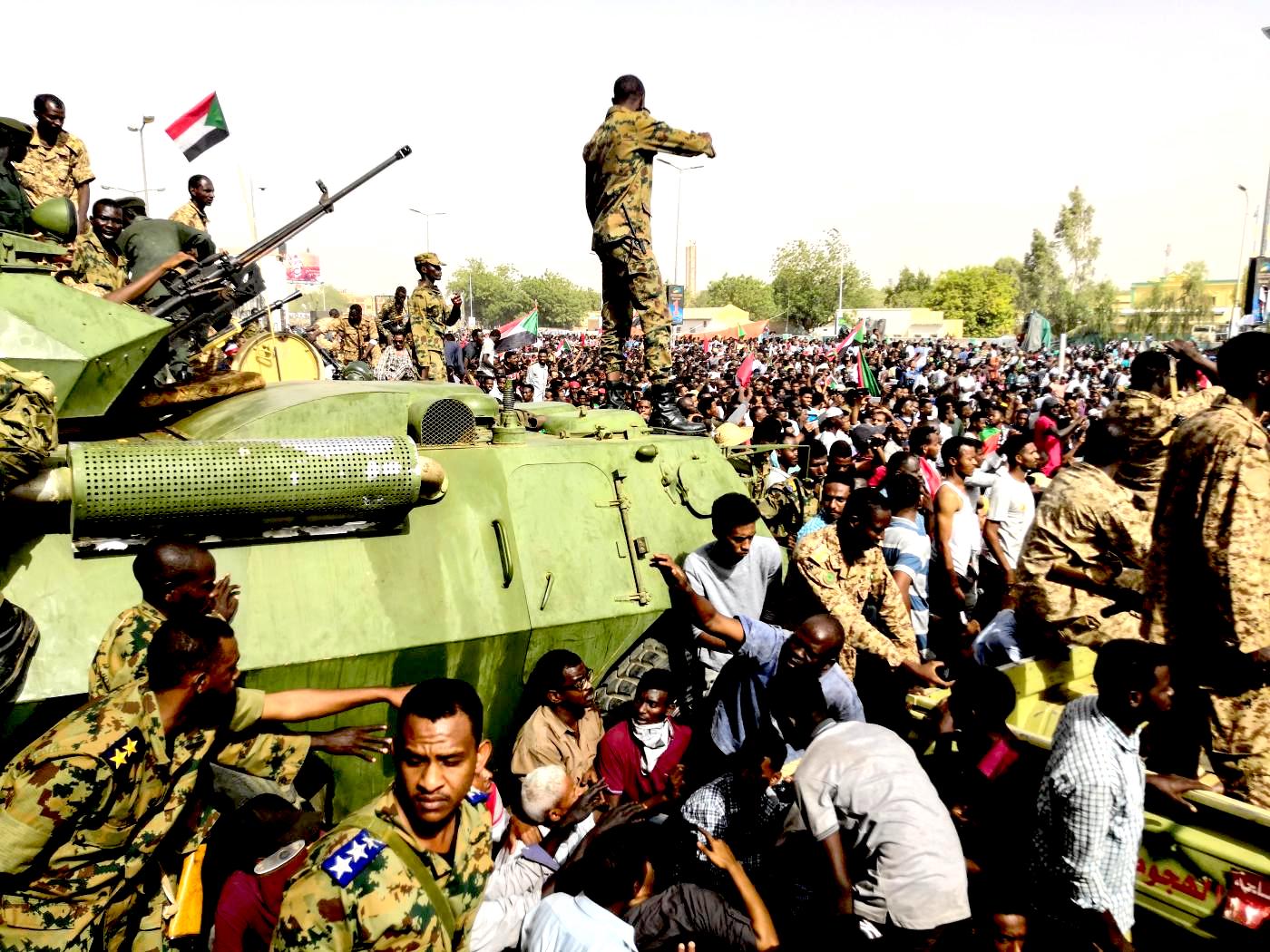
Sudanese soldeirs stand guard around armoured military vehicles as demonstrators continue their protest against the regime near the army headquarters in the capital city of Khartoum, April 11, 2019. (Agence France Presse, CC0, Wikimedia Commons)
Given this track record, it was a surprise when the civilian Prime Minister Hamdok entered into another IMF program in 2021 when it was supposed to be turning over a new leaf. Subsidy cuts began in 2020 prior to the signing of the agreement while the country was battling the Covid -19 pandemic and facing other challenges.
Since October 2021, the Sudanese people have protested the military takeover at the cost of hundreds of lives. On the surface, the “international community” seemed to punish the military coup by suspending aid and debt relief, but on the ground, the military regime was given a seat at the negotiating table, and perhaps even a position of priority in dictating the “peace terms.”
On the other hand, the demand from the people had been clear all along that they wanted justice, an end to the military regime and most importantly, a complete restructuring of Sudan’s economy so that the needs of the people could be served.
A real transformative process can only begin with first understanding the root causes of the people’s discontent, for example, by acknowledging that the military elites not only brutalize any form of dissent but also control the majority of Sudan’s natural resources which they use for themselves and foreign actors.
It is crucial to ensure that civil society organizations are given a priority seat at the negotiating table so that the voices of the common people can be heard and taken into account.
Dian Maria Blandina is a correspondent for Peoples Dispatch.
This article is from Peoples Dispatch.
The views expressed are solely those of the author and may or may not reflect those of Consortium News.
Support CN‘s Spring
Fund Drive Today


IMF = I-instant M-isery F-ollows – sheer poison for the so-called Third World countries.
Consider that the USA keeps complaining that China gets countries indebted and should not be considered as effective as the IMF! China enters into voluntary agreements, encourages projects that benefit the partners, as well as China (ie trade deals and transport infrastructure to allow easier trading) and does NOT allow debts to disrupt beneficial affects on the population of the partners (which are actually partners and not debt slaves and destroyers like the IMF).
sigh…. it sounds as if the IMF ( International Monetary Fund) exists only to corrupt the system so that only the few will thrive. Although, maybe IMF really stands for I am F***ed. That seems more realistic for the majority of people in the world.
Any time he IMF is involved, the next governing group to get involved is USAID. It allows countries to borrow money, but the countries who borrow the money are REQUIRED to use America’s corporations to do all the work, with little to no benefits to the country where they are doing business.
Rather than empowering the country involved, they rape that country of its natural resources, while doing a crappy job. In the end the country has barely anything built, but still owes huge sums of money.
America is a slippery country, with many international vices.
The IMF and World Bank are the predatory banks of the Western imperialists as reflected by John Perkins in his book “Confessions of an Economic Hit Man”.
I just put that book on my book list. It looks so interesting.
And how long ago did this book appear? And have we cared to learn from it? NO!
Dr. King tried to say this almost sixty years ago ….
“Increasingly, by choice or by accident, this is the role our nation has taken, the role of those who make peaceful revolution impossible by refusing to give up the privileges and the pleasures that come from the immense profits of overseas investments. I am convinced that if we are to get on the right side of the world revolution, we as a nation must undergo a radical revolution of values. We must rapidly begin [ applause ], we must rapidly begin the shift from a thing-oriented society to a person-oriented society. When machines and computers, profit motives and property rights, are considered more important than people, the giant triplets of racism, extreme materialism, and militarism are incapable of being conquered.”
“Beyond Vietnam”, Riverside Church, NYC, April 4, 1967.
One year later to the day, they put a bullet into his brain.
A writer named Chalmers Johnson (IIRC) wrote an interesting piece about ‘orthodox economics’ as the introduction to his book “Blowback”. I’ve lost the book during one of my unplanned ‘moves’ this millennium, so I can’t quote it directly. But the gist of it refers to ‘Economics’ as more of a religion than a scientific discipline.
It appears that Faith comes first, with the Faithful then finding ‘signs’ that they say point to as their proof, as opposed to a science that collects hard evidence without bias and then draws logical conclusions from those facts.
Thus, the High Priests of the Religion of Capitalist Economics always start with the Faith that the Free Market is always good and always correct. Even when these ‘markets’ of the modern era are certainly not close to the actual ‘free markets’ of capitalist theory, but have instead long ago been rigged to the benefit of the rich. What these High Priests will never do is to dispassionately collect facts and then use logic to reach conclusion. They let Faith guide them instead.
I read that introduction long ago, so I can’t tell you how much of the above is from it, or how much has come from personal experience. But the notion that ‘Economics’ is in reality is a Faith-Based Religion has stuck in my head, and I can’t think of any thing in the intervening decades that has shaken that thought one little bit. For instance, the Bankers thinking they could print $Trillions to give to the Rich during the Pandemic, with the Faith that their Holy Book had been revised to say that it would not cause Inflation. Their ‘Economics’ is clearly not a Science.
If you find the book on a discount stand, you might get it. Its an interesting book. It was popular after 9-11, when the title seemed so very appropriate, but it is not about terrorism but about economics and the American Empire in Asia. I’d say it is still worth a couple of decades later. “Blowback” by Chalmers Johnson.
I hope that supporters of CN would not need to be told about Chalmers Johnson, whose books are outstanding and whose many interviews are also very valuable and available on youtube. “Blowback” gave this word its prominence , and The Perils of Empire and Nemesis made up the best-selling trilogy in the 2000s, following many other books he has written.
Thanks for the recommendation. An economist I recommend is Yanis Varoufakis, who says economics have been taught the same for two hundred years, wrong. He’s the most intelligent economist I’ve ever read or heard speak. When the “progressive left wing” was voted in in Greece, he was named finance minister by the new prime minister Alexis Tsipras who ran on anti-austerity for the Syriza party. I noticed within a brief time, the new prime minister caved to the Troika and after five or six months dealing with those PTB, Varoufakis realized he couldn’t dent the armor of the Troika (the European Commission, the European Central Bank and the International Monetary Fund), and he resigned. Money-hungry mongrels run the world and only a world-wide revolution will take them out of power.
“Accumulation of wealth at one pole is therefore, at the same time accumulation of misery, agony of toil, slavery, ignorance, brutality, mental degradation, at the opposite pole, i.e., on the side of the class that produces its product in the form of capital.”
—– Karl Marx
Thus has been the sordid history of the IMF
“A complete restructuring of Sudan’s economy so that the needs of the people could be served” – What an unreasonable demand! How will the capitalist class sleep at night if they can not exploit others. Have you thought about their plight? How dare you demand such things? ..\s
The IMF and world bank are just tools of the U$A that enable asset stripping and exploitation of poorer countries. Austerity measures and tieing in to the dollar economy ensures they will never be free, and the MIC and military bases will not be far behind.
If the IMF policies were performance related, ie. we do this and the peoples lives improve, then it would be clearly seen that these policies fail every time.
Evil incarnate !
Right you are. The IMF/IBRD are tools of US financial imperialism and dollar hegemony. All loans are made in USD and must be repaid in USD, no matter what happens to the domestic currency or economy.
JM Keynes opposed this system at Bretton Woods in 1944. He had other ideas for international balance of payments settlements, international credit mechanisms and a central bank reserve currency that was not a national currency. Of course, he was shot down and the Almighty Dollar won.
In short, the IMF should be abolished and ground into the dustbin of history. IMF “structural adjustment” and other policies have resulted in increasing poverty, declining life expectancy and death. It might sound hyperbolic to many, but they are mass murderers parasites with suits and ties.
The IMF is dubbed the International Murder Fund in some Latin American countries. An apt description.